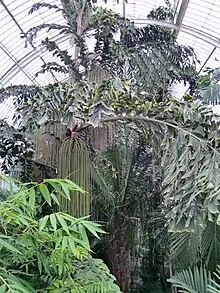Caryota rumphiana
Caryota rumphiana, whose common names include the fishtail or Albert palm, is a Caryota or fish tail palm (Family Palmae or Arecaceae). It is native to Philippines, Sulawesi, Maluku, New Guinea, Solomon Islands, Bismarck Archipelago.[1][2][3][4][5] Its leaves have a distinctive fishtail shape and its flowers have been described as mop-like. It is monocarpic. These leaves are bipinnate with as many as 1,800 fan-shaped or wedge-shaped leaflets, each up to 15 inches (38 centimeters) long by six inches (15 cm) wide.[6]
| Caryota rumphiana | |
|---|---|
 | |
| Scientific classification | |
| Kingdom: | Plantae |
| Clade: | Tracheophytes |
| Clade: | Angiosperms |
| Clade: | Monocots |
| Clade: | Commelinids |
| Order: | Arecales |
| Family: | Arecaceae |
| Genus: | Caryota |
| Species: | C. rumphiana |
| Binomial name | |
| Caryota rumphiana Mart. | |
| Synonyms[1] | |
| |
References
- Kew World Checklist of Selected Plant Families
- "Caryota rumphiana". Germplasm Resources Information Network. Agricultural Research Service, United States Department of Agriculture. Retrieved 30 July 2009.
- Govaerts, R. & Dransfield, J. (2005). World Checklist of Palms: 1-223. The Board of Trustees of the Royal Botanic Gardens, Kew.
- Takeuchi, W. (2005). Floristic notes from a holocene successional environment in Papuasia. Harvard Papers in Botany 10: 95-116.
- Dowe, J.L. (2010). Australian palms: biogeography, ecology and systematics: 1-290. CSIRO Publishing.
- Gardener's Chronicle Volume 3 (third series) (March 17, 1888) page 334.
This article is issued from Wikipedia. The text is licensed under Creative Commons - Attribution - Sharealike. Additional terms may apply for the media files.